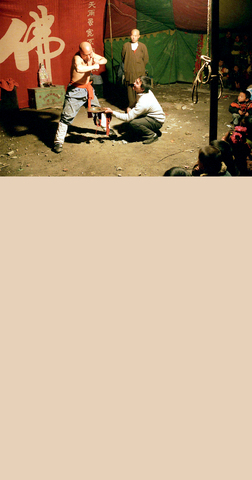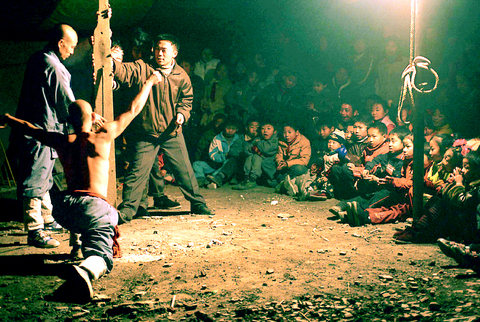The bald man in a monk's flowing robe pounded a drum and a dull, rising beat echoed through the darkened streets with a promise of something in short supply in this grim, isolated town: entertainment.
The circus had come to town, in the form of a dirty pink bus carrying about 20 men claiming to be disciples of China's most revered kung fu traditions. But this would not be a fighting exhibition. The men promised to eat metal balls, sleep on beds of sharpened blades and perform other acts of physical wonder.

All for the low price of 3 yuan, or about 36 cents, cheap even for China. They pitched a striped tent on a vacant lot littered with broken concrete, beat the drum and waited. In a town where the closest city is three hours away by narrow mountain road, people came.

PHOTO: NY TIMES
"This is not a movie," promised the announcer, who provided commentary and pounding disco music during the show. "This is not a video. This is a real live show."
It was less certain whether these were real live monks. But, really, that did not matter to the more than 100 people who crowded into the tent on a cold winter night, many of them squealing young children whose usual entertainment is state television.
In remote Chinese towns like Xinglong, the traveling show is a tradition much like the freak shows that sometimes still turn up at county fairs in the US. Usually, these Chinese troupes gravitate to smaller places with vaudeville-style shows of singing and dancing, or Chinese opera. Sometimes they bring circus acts.
"There are lots of them in the summer," said Yu Zhimei, who owns a restaurant, Higher than Heaven, a half block from the tent. "Circuses and singing and dancing performances. The audiences love it."
But gesturing toward the tent, she sniffed. "Sometimes the level of sophistication is very low. Some groups like this don't have much money. They just use a tent. Other, better groups can rent the hall in town."
Inside the tent, the small children bundled in smudged winter coats did not seem to mind. They watched a shirtless, chubby man offer a short prayer to Buddha. Then he grimaced and groaned as a man from the audience dropped four small metal pellets the size of BBs into his mouth.
"Quicker, quicker!" the children screamed.
The man grunted and stuck out his tongue as proof that he had swallowed the pellets. Then he promised to retrieve them.
"They will go through my body," he promised. "I'm going to push them back through my mouth, eyes or ears. Which one do you wish?"
The children showed no mercy. "Your eyes!" they shouted.
He gritted his teeth and pressed his hand against the right side of his stomach. He said he was going to push the BBs through his chest into his head. He said he was summoning his years of physical and spiritual training as a fighting monk.
Apparently, that was not enough.
"Give him a chopstick, friend!" the announcer shouted.
The monk then pressed the chopstick against a bulging vein in his neck, pushing it slowly upward until a silver glint appeared in the corner of his eyelet.
"Clink, clink."
Two small metal pellets fell out of his right eye into a tin cup below. A few seconds later, after sliding the chopstick up his left side, the monk produced two more balls, out of his left eye. The astonished crowd murmured as if they had witnessed a miracle. (No one seemed suspicious that the monk had shielded his eyes moments earlier, perhaps just long enough to slip in the BBs).
It was one act of many. One monk tightened a steel cord around his neck until his face turned purple, and another bound his chest in sharpened metal wire. A "junior monk" dislocated his shoulder and then popped it back into place as the announcer declared he needed a few days of rest.
But at the intermission, the performers showed their true talent: moving merchandise.
The junior monk's shoulder had miraculously recovered; he was dangling prayer beads and other trinkets for sale. Other monks plunged into the crowd selling glow-in-the-dark Buddhas on key chains. The announcer claimed everything was imbued with mystical qualities, never mind that it all looked like so much cheap plastic.
"These things are real," the announcer promised. "If you take it home, they will bring good luck and happiness. We've got limited mementoes and limited time."
Chai Guofu, a spectator, seemed dazzled by the spectacle. "He used qigong to drink the balls into the body and push it out of his eyes," Chai said, using the word for traditional Chinese breathing exercises.
Another spectator was a bit more skeptical. "We've got no entertainment," the man said. "There's nothing to do. The officials are corrupt. They don't build any entertainment facilities for us. So we come to this."
The monks were wary of questioning from the only foreigner under the tent. One, Shi Yongfa, said the troupe "travels to so many places that I can't remember them." Another said they had all been raised at the famed Shaolin Monastery, considered the home of kung fu, a boast they used to lure in spectators.
But the man deferred any questions to the troupe's manager. The man said the group planned to perform for two more nights in Xinglong and that the manager would be available in the morning.
The intermission lasted about 30 minutes until the announcer introduced a pudgy monk and another man carrying an "ancient Chinese beheading blade." "I will cut off his head so everyone can eat some monk meat," the announcer promised, to the delight of the children.
Instead, the other monks brought out another large saw and made a table of two parallel blades. The pudgy monk lay down atop the sharpened blades with a grimace.
"This is a soft bed from Chongqing," the announcer said. Another monk then stood on his stomach. "Let's check and see if he's dead or not," the announcer said helpfully.
He was not.
The next day, as the people of Xinglong went back to work, the pink bus had left town. There would be no interview with the manager. The monks had left for another nowhere town in need of a laugh and some glow-in-the-dark Buddha key chains.

The 2018 nine-in-one local elections were a wild ride that no one saw coming. Entering that year, the Chinese Nationalist Party (KMT) was demoralized and in disarray — and fearing an existential crisis. By the end of the year, the party was riding high and swept most of the country in a landslide, including toppling the Democratic Progressive Party (DPP) in their Kaohsiung stronghold. Could something like that happen again on the DPP side in this year’s nine-in-one elections? The short answer is not exactly; the conditions were very specific. However, it does illustrate how swiftly every assumption early in an

Francis William White, an Englishman who late in the 1860s served as Commissioner of the Imperial Customs Service in Tainan, published the tale of a jaunt he took one winter in 1868: A visit to the interior of south Formosa (1870). White’s journey took him into the mountains, where he mused on the difficult terrain and the ease with which his little group could be ambushed in the crags and dense vegetation. At one point he stays at the house of a local near a stream on the border of indigenous territory: “Their matchlocks, which were kept in excellent order,

Jan. 19 to Jan. 25 In 1933, an all-star team of musicians and lyricists began shaping a new sound. The person who brought them together was Chen Chun-yu (陳君玉), head of Columbia Records’ arts department. Tasked with creating Taiwanese “pop music,” they released hit after hit that year, with Chen contributing lyrics to several of the songs himself. Many figures from that group, including composer Teng Yu-hsien (鄧雨賢), vocalist Chun-chun (純純, Sun-sun in Taiwanese) and lyricist Lee Lin-chiu (李臨秋) remain well-known today, particularly for the famous classic Longing for the Spring Breeze (望春風). Chen, however, is not a name

There is no question that Tyrannosaurus rex got big. In fact, this fearsome dinosaur may have been Earth’s most massive land predator of all time. But the question of how quickly T. rex achieved its maximum size has been a matter of debate. A new study examining bone tissue microstructure in the leg bones of 17 fossil specimens concludes that Tyrannosaurus took about 40 years to reach its maximum size of roughly 8 tons, some 15 years more than previously estimated. As part of the study, the researchers identified previously unknown growth marks in these bones that could be seen only